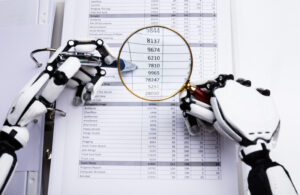The hype over generative AI is as thick as a swarm of mosquitos in a peat bog at sundown. You can’t go anywhere, online or off, without hearing the relentless buzz about Gen AI ushering in a transformation the likes of which has never been seen.
The world will look nothing like it does today when Gen AI done reinventing it. Or so we’re told, anyway. Just the same, Gen AI has done some pretty cool stuff already. Here are just a few things that Gen AI is doing now:
Filing Your Taxes
Quick–what’s the most tiresome and boring activity you’re required by law to do every spring? If you said “file your taxes,” then give yourself a gold star! But thanks to generative AI, we’ll soon be on Easy Street when it comes to giving Uncle Sam his due.
A company called Taxfyle this week announced it’s adopting generative AI with its tax filing solution. The bots won’t completely take control, according to the company, but they will “empower tax professionals to be more accurate and efficient,” the company says.
“Taxfyle’s AI will transform the role of a tax professional from a preparer to a reviewer, improving margins and providing a solution to the industry’s staffing shortages,” the company says.
Diagnosing and Treating Your Illness
A new report from GlobalData found that generative AI is poised to have a major impact on healthcare and pharmaceutical industries. In healthcare, it will lead to cost-savings and improvements in patient care, while drugmakers will benefit from generative novel drug candidates.
“Gen AI can streamline personalized care and guided diagnosis by synthesizing key data points from patients’ medical history, family history, and lifestyle,” said Saurabh Daga, Associate Project Manager of Disruptive Tech at GlobalData. “The technology can help physicians provide more effective care at lower costs, leading to better patient outcomes.”
Meanwhile, the company pharmaceutical companies like Huma.AI, Insilico Medicine, and Absci are already using generative models to help come up withn novel drug candidates using new technology, such as Google’s MedPalm 2 and NVIDIA’s BioNeMo Cloud.
Creating Ghost Tom Hanks
Now that the Hollywood actors are joining writers on strike, Gen AI appears ready to grab a chunk of the big screen action. That may be bad news for the thousands of journeymen actors and writers, but it’s great news for the ghost version of Tom Hanks.
“Anybody can now recreate themselves at any age they are, by way of AI or deep fake technology,” Hanks said on a recent podcast, according to a story in Forbes. “I could be hit by a bus tomorrow and that’s it, but my performances can go on and on and on.”
Hanks reportedly earns $25 million per film. It’s unclear how much Hank’s ghost version will make.
Encoding Scientific Knowledge
Large language models excel at making large pools of text accessible through a natural language interface–think of it as Google search engine on steroids. Scientists have long sought methods to encapsulate and encode their large bodies of work, to varying degrees of success. Now GenAI is providing another tool.
According to a recent Nature article, scientists are experimenting with using Google’s MedPalm 2 to encode a wide array of scientific knowledge. However, there’s a bit of work to do.
“These models, although useful, are predominantly single-task systems…lacking expressivity and interactive capabilities,” the authors write. “As a result, there is a discordance between what today’s models can do and what may be expected of them in real-world clinical workflows.”
Making the Postseason
Professional sports teams have long sought the benefits of big data analytics. It’s no different with the current wave of generative AI, and one of the first teams to open up about their use of Gen AI is the Texas Rangers.
The team is currently implementing Gen AI to give scouts and player development personnel an edge with their paperwork, according to Alexander Booth, who is the assistant director of R&D for the team.
“There’s a lot to sift through,” he said during the recent Databricks conference. “There’s thousands of players in baseball and trying to understand how the sentiment tracks from one player to the next is difficult at scale.”
At the All Star Break, the Rangers, who have never won the World Series, lead the AL West and the Houston Astros by two games.
Writing Smart Contract Documentation
Smart contracts are programs stored on a blockchain that run when predetermined conditions are met. Now you can have ChatGPT document your smart programs for you.
A Singapore company called Bunzz PTE LTD this month is rolling out DeCipher, which uses ChatGPT 3.5 and 4 to automatically generate smart contract documentation. Users simply copy and paste their contract’s URL into the screen, and the documentation is created for you.
Preventing Sleep from Happening

An AI-generated trailer for a Heidi movie
We’re about ready to test how much appetite there is for AI-generated animation (not to mention the Polar Express remake featuring Hank’s AI ghost). Some say the appetite is practically unlimited, as the new AI techniques are just a natural extension of the automation that animators have been using for years.
Others aren’t so sure. One Reddit user is regretting his dalliance with AI-generated content. “I’ve asked an AI to generate a trailer for a HEIDI movie and now I can never sleep again,” the user wrote.
There is clearly some more work to be done in the field of Gen AI and movie-making.
Improving Customer Service Everywhere
Just about any industry that involves a person serving customers is potentially at risk of being disrupted by Gen AI. According to research by Insight Enterprises, 72% of business leaders want to adopt generative AI primarily to improve employee productivity and customer service.
But we’ve just scratched the surface when it comes to Gen AI, says Matt Jackson, Insight’s Global CTO. “These large language models will transform how businesses interact and make decisions,” Jackson says. “The use cases are almost unlimited, and it’s changing the nature of work as we know it.”
The post Gen AI Is Doing What?! appeared first on Datanami.



0 Commentaires